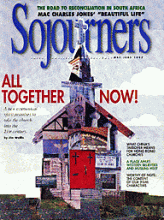I was in Cairo, attending the first day of a conference on the interactions between the West and Islam. Most of us had taken our box lunches to the concrete terrace outside the hotel meeting room. Jet-lagged, dazed, and blinking in the desert sun, I found myself struggling to open the screwtop cap on a bottle of mango drink, to the amusement of my lunch companions.
"Just say the name of God and twist," said a Muslim scholar, her eyes twinkling.
"Yes, just like Islam does to the West," observed the Egyptian professor sitting at my side.
It was a joke among believers, as I knew myself and the two people teasing me to be. We are not believers in identical ways, nor readers of the same sacred text. But the mere fact of faith in God, and knowing that our faith shapes our view of reality, gave me a sense of affinity with these Muslim colleagues that as a Christian American woman I didnt necessarily expect to find.
This is not an article about how a shared sense of the transcendent might help us all get along. A long, bloody global history of religion-fueled conflicts testifies that nothing is that simple.
But during several days of discussing globalization, human rights, secularism, democracy, and a host of other topics and subtopics concerning the relations between the West and Islam (as part of a group of both Westerners and Muslims), I kept returning to that small sense of affinity-despite-difference. It was a calm point, utterly real, in the midst of contradictions, challenges, and divisions that are also utterly real.
Read the Full Article

